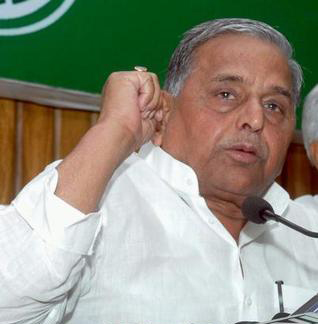 New Delhi, December 28: Samajwadi Party has asked the Centre to facilitate "Muslim quota", betraying concern that a strident party stamp on minority politics can neutralize its fledgling attempts to bait upper castes and OBCs with 'promotion quota'.
New Delhi, December 28: Samajwadi Party has asked the Centre to facilitate "Muslim quota", betraying concern that a strident party stamp on minority politics can neutralize its fledgling attempts to bait upper castes and OBCs with 'promotion quota'.
SP leader Ramgopal Yadav said, "We will pass a resolution in UP assembly to ask the Centre to amend the Constitution to allow reservation for Muslims in jobs and education." He said the Supreme Court has repeatedly struck down religion-based quota like in Andhra Pradesh. "It is best done by tweaking the Constitution," he told TOI.
Ostensibly to ensure an iron-clad quota law, Mulayam Singh Yadav's caution to pass the buck to the Centre has surprised observers in view of his history of muscular minority politics. It is seen as realpolitik from the wily Yadav chieftain who may see the revived stridency on Muslim quota as a red rag for upper castes and non-Yadav backwards.
The Yadav camp is aggressively opposing reservation in promotions for SCs/STs in the hope that it would polarize upper castes and backwards in its favour — non-dalits are opposed to the Centre's move to restore quota. Samajwadis stalled the quota bill in the winter session of Parliament.
SP had all but forgotten its poll promise to provide 18% quota for Muslims but was forced to revive it after a vicious assault from bete noire Mayawati. In an interview to TOI last week, the BSP supremo accused Mulayam of lip service to social groups, saying the Akhilesh Yadav regime had done nothing to enact Muslim quota in nine months in power.
Though forced to react on an issue concerning its core vote base, Samajwadi camp is treading carefully. The move to pass an assembly resolution seems aimed at making minority quota appear a demand cutting across the secular spectrum that includes BSP and Congress.
The collective political stamp would dilute Samajwadi authorship on Muslim reservation and may soften the resultant anger among upper castes and backwards.
The apprehension over Hindu reaction to minority quota stems from the failure of Congress in UP polls this year. Rahul Gandhi led an aggressive campaign by highlighting the centrally-moved 4.5% sub-quota for Muslim OBCs. The party finished poorly, failing to win upper castes while triggering a backlash from backwards who saw the sub-quota as eating into their 27% share.
Mayawati's gambit behind attacking SP on minority quota appeared aimed at forcing 'Maulana Mulayam' to take an aggressive stance on the issue that would stymie his newly-attempted appeal among upper castes and sections of Hindu backwards.





Comments
Add new comment